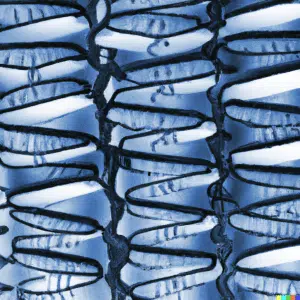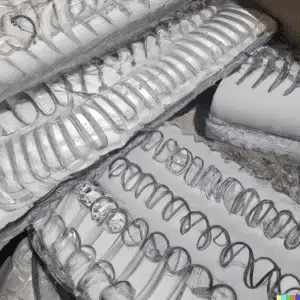Bed Coils
In This Article
What Are Bed Coils?

In a traditional innerspring mattress, the coils are arranged in rows and connected with wire. The thickness and height of the coils can vary, with thicker coils generally providing more support and durability. In some cases, the coils may be individually wrapped in fabric to reduce motion transfer and increase comfort.
Other types of mattresses, such as memory foam or latex mattresses, may not use traditional coil support systems. Instead, these mattresses may use foam or other materials to provide support and comfort. However, some hybrid mattresses may combine coil support systems with other materials for a unique balance of comfort and support.
Types of Coils Used in Mattresses
There are several types of coils used in mattresses, each with its own unique design and features. Here are some common types:
Bonnell coils: Bonnell coils are the most traditional and commonly used type of coil in mattresses. They are hourglass-shaped and interconnected, with a thinner gauge wire that is typically less expensive than other coil types. Bonnell coils may provide good support but can be prone to motion transfer and noise.
Offset coils: Offset coils are similar in shape to Bonnell coils but with a flattened head and curved bottom. This design allows the coils to conform to the body’s contours and reduce pressure points while still providing good support and durability.
Continuous coils: Continuous coils are made from a single piece of wire woven into S-shaped coils. This design provides good support and reduces motion transfer but may be less durable than other coil types.
Encased coils: Encased coils are individually wrapped coils that are each placed in their own fabric casing. This design allows each coil to move independently, providing targeted support and reducing motion transfer. Encased coils may be more expensive than other coil types but generally offer superior comfort and support.
Micro coils: Micro coils are small, individually wrapped coils typically found in a mattress’s comfort layer. They provide targeted support and contouring for the body and can help reduce pressure points and improve overall comfort.
Advantages of Using Coils in a Mattress
There are several advantages to using coils in a mattress:
Support: Coils provide a sturdy and supportive foundation for the mattress, helping to distribute weight evenly and reduce pressure points. This can help prevent discomfort, pain, and soreness.
Durability: Coils are typically made from strong and durable materials, such as steel, which can withstand regular use over time. This can help extend the lifespan of the mattress and reduce the need for frequent replacements.
Customization: Different types and configurations of coils can be used to create a customized level of support and comfort for the individual. This can help ensure that the mattress meets the specific needs and preferences of the user.
Motion isolation: In some types of coil systems, each coil is individually wrapped in fabric. This can help reduce motion transfer across the mattress, which can be beneficial for individuals who share a bed and may be disturbed by their partner’s movements.
Airflow: Coils allow for airflow within the mattress, which can help regulate temperature and prevent heat buildup. This can be particularly beneficial for individuals who tend to sleep hot or sweat during the night.
Disadvantages of Using Coils in a Mattress
There are some disadvantages to using coils in a mattress:
Motion transfer: Coils can transfer motion across the mattress, which can be a disadvantage for individuals who share a bed and are disturbed by their partner’s movements during the night.
Noise: Some types of coil systems, such as Bonnell coils, may produce noise when compressed or moved. This can be a disadvantage for individuals who are sensitive to noise or easily disturbed during the night.
Durability: While coils can provide good support and durability, they may also be prone to wear and tear over time. This can lead to sagging or indentations in the mattress, which can reduce comfort and support.
Cost: Depending on the type and design of the coil system, mattresses with coils may be more expensive than other types of mattresses, such as foam or latex mattresses.
Allergies: Coils may accumulate dust, dirt, and other allergens over time, which can be a disadvantage for individuals with allergies or respiratory issues.
Factors to Consider Before Choosing a Coil System
When selecting a mattress with a coil system, there are several factors to consider:
Coil gauge: The thickness of the coil wire, or gauge, can vary between mattresses. Thicker gauges may provide more support and durability, but may also be less conforming and less comfortable.
Coil count: The number of coils in a mattress can also vary. A higher coil count can provide more support and durability, but may also increase the cost of the mattress.
Coil configuration: The way in which the coils are arranged and connected can affect the level of support and comfort provided by the mattress. Individuals should consider the specific configuration of the coil system before selecting a mattress.
Firmness level: The firmness level of the mattress can also be affected by the type and design of the coil system. Individuals should consider their preferred level of firmness when selecting a mattress with a coil system.
Care and Maintenance for Your Coil System Mattress
Proper care and maintenance can help extend the lifespan of your mattress with a coil system. Here are some tips to keep in mind:
Rotate the mattress regularly: To ensure even wear and tear on the coil system, rotate the mattress every 3-6 months. This will prevent excessive pressure on specific areas of the mattress.
Use a mattress protector: A mattress protector can help keep the mattress clean and free from spills, stains, and allergens. Make sure to choose a protector that fits properly and is breathable.
Keep the mattress clean: Regularly vacuum the mattress to remove dust, dirt, and other debris. If necessary, spot clean the mattress using a mild detergent and water.
Don’t jump on the bed: Jumping or bouncing on the bed can damage the coil system and reduce the lifespan of the mattress.
Avoid bending or folding the mattress: Bending or folding the mattress can damage the coil system and lead to sagging or indentations.
Consider a supportive foundation: The foundation or box spring that supports the mattress can also affect the lifespan of the coil system. Make sure to use a supportive foundation that is compatible with your specific mattress.
Replace the mattress when necessary: Even with proper care and maintenance, a mattress with a coil system will eventually wear out and lose its support. Consider replacing the mattress when it becomes uncomfortable or loses its shape.
Frequently Asked Questions
The coil gauge refers to the thickness of the wire used to make the coils in a mattress. The gauge is measured in numbers, with lower numbers indicating a thicker wire and higher numbers indicating a thinner wire.
The coil gauge can affect the level of support and durability provided by the mattress. Thicker coils with a lower gauge can provide more support and durability, as they are less likely to break or bend over time. Thinner coils with a higher gauge may be more flexible and conforming, but may also be more prone to wear and tear.
When selecting a mattress, it’s important to consider the coil gauge in relation to the other components of the mattress, such as the coil count and overall design. The specific needs and preferences of the individual should also be taken into account, as some individuals may prefer a thicker or thinner gauge depending on their sleeping position and comfort preferences.
The coil count is one of the factors that can affect the level of support and durability provided by a mattress. The coil count refers to the number of coils in the mattress, with higher counts typically indicating a denser and more supportive coil system.
However, while coil count can be an important factor, it is not the only one to consider when selecting a mattress. The type and design of the coils, the gauge of the wire, and the overall construction of the mattress can also affect its level of support and durability.
Additionally, the specific needs and preferences of the individual should be taken into account when selecting a mattress. For example, some individuals may prefer a firmer mattress with a higher coil count, while others may prefer a softer mattress with a lower coil count.


